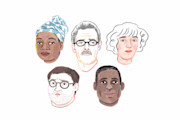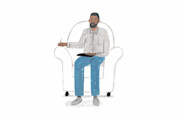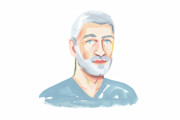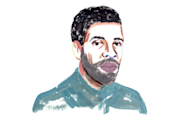My name is Jay and I’m an alcoholic.
In January 2006, after a handful of detox stints, an expulsion from a rehab, and a year-and-a-half long binge I’d intended to last only a night, I had my last drink. A harrowing and humbling home detox showed me I’d lost control. I crawled into my first meeting at 24 years old.
I took to recovery right away. It was only a couple months before I grew cocky. I was younger than most others, and I judged them for wasting their potential, forfeiting their young adulthood to their addictions. When asked to chair meetings, I would wax philosophic about being chemical-free. “Doctors used to claim I was mentally ill and prescribe me meds,” I’d say, “But now that I’m sober, I don’t need pills.”
It was a slap across the face to many in the room, and I knew it. But I sincerely believed that when addiction was treated, medication was superfluous. And I wanted to help my fellow addicts—what better way to help than tough love? I felt people needed to hear my opinions: I claimed so-called mental illnesses were misdiagnoses of the disease of addiction.
I contended that mental illness was no more than a verdict delivered by psychiatrists. These “normies” didn’t get it, and they were out of line, speaking about issues that should have been left to recovering alcoholics—and that meant sober, med-free addicts. Following the program, working on the “true” illness, modeling sober living: these would mean you didn’t need medication.
After my rants, I bathed in congratulations. People clapped. People wanted to shake my hand.
But I sincerely believed that when addiction was treated, medication was superfluous.
Meanwhile, my own anxiety was flaring. I’ve always catastrophized; drinking to quell my thoughts had been my solution. But now, sober, I’d spend entire days fretting about something I said to a friend, something I didn’t say to a friend, Facebook statuses I posted and then deleted, an odd look I thought a stranger gave me.
When I bragged in meetings, I read from notes held in shaky hands, terrified I’d get lost. To make minor decisions, I needed multiple people to validate my choices, even if I knew for certain what I wanted. I scheduled compulsively because I needed to feel control over my time to feel safe.
And then I’d forget birthdays, anniversaries, and major milestones because I was obsessing over minor events.
I told myself—and the world—that I was functioning. “Look at me, no meds!” When I missed out on jobs and screwed up relationships, people comforted me. When I rambled, adding digression to digression, people smiled and laughed. Getting in my own way was nothing more than a cute neurosis.
At eight-years sober, I got engaged to my then-girlfriend. Months before the wedding, I sat at my older sister’s kitchen table, listening in stunned silence as her husband, my brother-in-law, the man I grew up worshipping, called her a bitch over and over. I watched as he walked out on his family. I watched him leave my sister to bring up three teens alone.
Something in me broke apart. If I had been so wrong about my hero, what else was I wrong about? If my sister couldn’t make marriage work, how could my fiancée and I?
All at once, my anxiety stopped being cute. I couldn’t sleep, haunted by visions of the future: I’d marry my girlfriend, we’d have kids, then I’d verbally assault her and storm out on my family. I couldn’t send the invitations, terrified I’d cancel at the last minute.
I told myself—and the world—that I was functioning.
I loved my girlfriend, but by staying with her I was causing her to suffer. She didn’t understand anxiety so every day that I was paralyzed with dread she grew increasingly furious (and she told me so). She’d planned a life with me, and I was ruining it.
Everything was a lie. I was lying to my family about going through with the wedding. Lying to hers about taking care of her. I walked to work blinking back tears. I couldn’t be present at my job, counseling at-risk youth, thanks to the screaming panic in my mind. “Not only am I a terrible boyfriend,” I told myself, “I’m terrible at my job.” I thought about moving, leaving the country.
I was hitting a rock bottom. But the fact of my recovery had taught me that my lowest lows can bring about my greatest growth. I had to mourn my sister’s marriage. I had to cut off my text-happy (former) brother-in-law. I had to realize that I was willing to go to any lengths to make my relationship work.
That meant I needed help. I tried meditation; I tried prayer; I walked and walked. I went to more meetings. And eventually, I turned to therapy.
“You’ve attempted nearly everything and it hasn’t worked,” my therapist said after a couple months. “Maybe it’s time we considered trying meds.”
I hated him for saying it, but I grudgingly offered an “I’ll think about it.” By then I was spending most nights alone on the couch obsessing over a future I couldn’t control. I hated my therapist for suggesting meds instead of making my decisions for me. I hated myself for being desperate, hated myself for my indecisiveness...and, eventually, I hated myself for contemplating meds.
I had been talking with my sponsor the entire time I was spiraling; where I was staunchly against the medication, he was not. "You are not a doctor, Jay,” he said. “People are trained for this.” I accepted the prescription. I accepted I had no other options.
The medication didn’t instantly solve all my problems, but I managed to mail the wedding invitations. On November 8, 2015 my wife and I walked the aisle. On our honeymoon, she was still fuming at me for how I’d mistreated her the months prior, and I was wounded that she didn’t understand what I’d been going through.
“You’ve attempted nearly everything and it hasn’t worked,” my therapist said after a couple months. “Maybe it’s time we considered trying meds.”
But among the wounds was a strange new feeling: hope. The chaos in my mind was clearing; I could see that no matter how terrible things seemed, it wouldn't last forever. Eventually, I stopped trudging through my days on the verge of crying. In therapy, I learned the definition of catastrophizing. I learned how to recognize when I was doing it.

That period was the worst in my life. It’s a crisper memory than my drinking days, but no less painful. I hurt my wife. I hurt myself. But I learned that even sober, I sometimes need help.
My doctor weaned me from the medication about a year later when my anxiety became manageable. But my wife and I know that my anxiety may spike again. Accepting that is comforting; so is knowing I can survive it. Support is there.
Eventually, I stopped trudging through my days on the verge of crying.
The Substance Abuse and Mental Health Services Administration (SAHMSA) reports that in 2018, 47.6 million adults over 18 had a mental illness. Of that population, 9.2 million had a substance use disorder—19.3%. Meanwhile, only 5% of adults not diagnosed with a mental illness had a substance use disorder.
Over 90% of adults with co-occurring disorders didn’t receive treatment for both.
Self-help programs advocate getting outside help for outside issues. That means if you have a mental illness you go to a professional—someone who has trained for this—not some average Joe in a meeting. In fact, in the pamphlet “Medications & Other Drugs,” official program literature, there’s a section called “Some alcoholics require medication.” It states:
“Because of the difficulties that many alcoholics have with drugs, some members have taken the position that no one in [the program] should take any medication.
While this position has undoubtedly prevented relapses for some, it has meant disaster for others.… Just as it is wrong to enable or support any alcoholic to become re-addicted to any drug, it’s equally wrong to deprive any alcoholic of medication, which can alleviate or control other disabling physical and/or emotional problems.”
Listening to a psychiatrist when he said I needed medication was a huge step in my sobriety.
I have rules for taking medications, laid out in the latter pamphlet. I disclose my addiction to doctors. I disclose my medications to my sponsor. I take medicine as prescribed and talk to both my sponsor and doctor if I have the urge to take more. It requires a rigorous honesty, to myself most of all.
When I was drinking, I didn’t listen to my parents or counselors or doctors. I didn’t listen to anyone. Listening to a psychiatrist when he said I needed medication was a huge step in my sobriety.
Today, I sit in meetings surrounded by people with disorders beyond addiction. Some of them are unable to accept it, thinking sobriety is the cure for all, suffering like I did because they won’t seek help.
Sometimes I see others rolling their eyes at mentions of mental illness like I used to. I just try to be there for the speaker, to listen and support them.
I share openly about my experiences with medications, too. It’s my story, living life on life’s terms without drinking. The best way I can be an example is by taking care of myself.

I cannot live a productive life while using, and I cannot live a productive life if I don’t treat my anxiety. That sometimes means I need to take medication. With 15 years sober, I can only speak for myself; other alcoholics and addicts feel differently. I have made my choices, and I’m healthier and happier for them.
Online anxiety quiz
Have you been feeling nervous or on edge lately? Take Monarch's free, online anxiety quiz to see if you have symptoms of anxiety disorder.
Alcoholics Anonymous (2011). Member-medications and other drugs. Retrieved: https://www.aa.org/pages/en_us/aa-member-medications-and-other-drugs
Substance Abuse and Mental Health Services Administration (SAMHSA). (2020). Substance use disorder treatment for people with co-occurring disorders (Treatment Improvement Protocol (TIP) Series, No. 42, SAMHSA Publication No. PEP20-02-01-004).[PDF] https://store.samhsa.gov/sites/default/files/SAMHSA_Digital_Download/PEP20-02-01-004_Final_508.pdf







